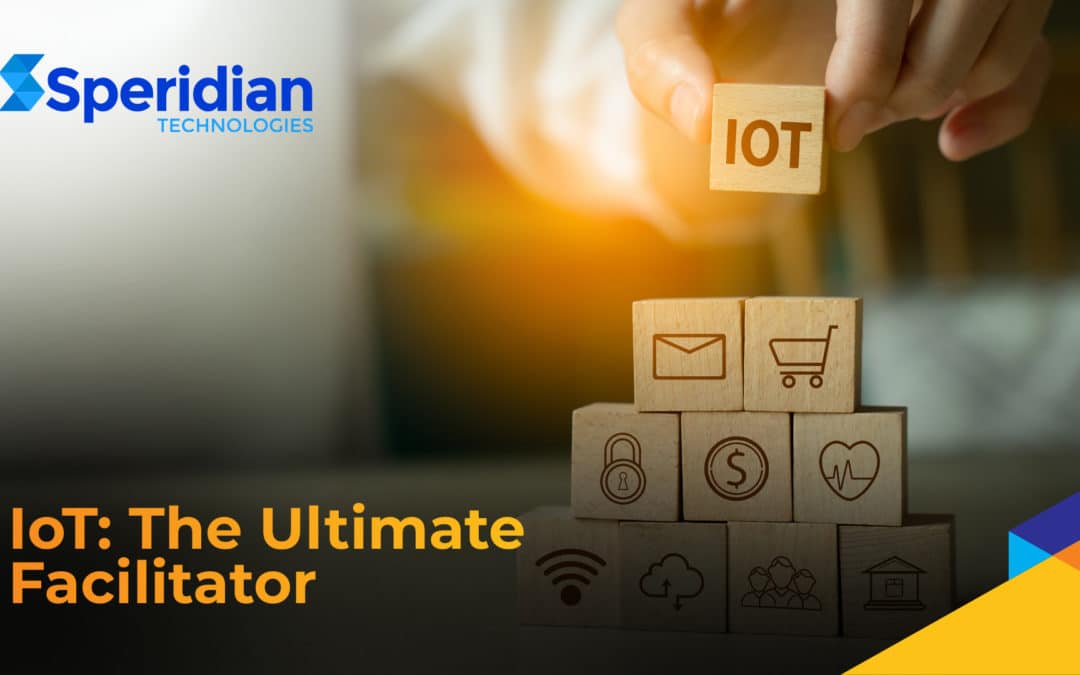IoT: The Ultimate Facilitator
Table of Contents
What Does Almost Every Person on Earth Have in Common?
In some form or another, we are all surrounded by internet connected devices, and these devices are what is considered the thing within the Internet of Things (IoT). Communicative devices can come in the form of, or be a part of, a cell phone, washing machine, tractor, laptop, or a specific part of a machine, etc. These devices capture real-time data using sensors and communicate the data over short, medium, or long-range networks, providing benefits to the end-user and the company that provided the product.
Companies can leverage this real-time data by identifying flaws in their product, measuring demand and usage patterns, or identifying potential new revenue streams. While the idea of devices communicating with each other is not brand new, IoT’s maturity and proven value has caught the attention of businesses large and small.
Brief History
Before IoT was actually IoT, its concept was originally applied to radio frequency identification). In the early to mid-nineties, corporations were focused on micro-tracking for macro insights. In 1999, Kevin Ashton, then executive director of the Auto-ID Center, coined the term “Internet of Things”. Auto-ID interestingly enough created the system foundation that RFID and sensors can operate within. This has changed the way companies track their products through every step of the supply chain or field process.
Why IoT Matters to Business
Companies are always looking to get ahead of problems and provide customers with exceptional service and experiences. By using IoT, businesses can revolutionize the way they attend to, cater to, or resolve customer issues, all while exceeding customer expectations.
For example, using predictive inventory management techniques, companies can have inventory readily available after a “Service, Inspect, Replace” notification from a device has been received. Having items in the right location or pre-ordered before something breaks down is the future of all physical things or devices that contain components capable of failure. It’s that simple. If a company can prevent or reduce downtime for machines or devices, that leads to money saved for the customer, and therefore a positive customer experience all around.
IoT: Important Considerations
While data management is an efficient way to get to know your customers better, it is important to understand the inherent boundaries surrounding customer data. IoT devices collect customer data, such as behavior, preferences, and location that help businesses serve customers better. However, there is a big debate on who actually owns the data, the customer or the company. This issue is even present in the relationship between a company and its technicians. How closely can a technician be monitored without making them feel uncomfortable and affecting their performance?
Customers will believe their privacy has been infringed upon if they are not receiving anything of value in return for the information your business is collecting. It requires a delicate balance. Investing in IoT development will require companies to make important decisions regarding data management and being sensitive to customer or employee privacy. This is just something to be aware of when introducing automation and the micro-tracking of assets to your business.
Network security is another high priority to consider when implementing IoT. Since IoT devices are connected via a network, protecting that network’s connectivity, data accuracy, and privacy is vital. The goal is to securely collect data that is authentic and complete.
Facilitating the Future
Today’s customer expects fast and personalized digital experiences from companies. By leveraging IoT that not only collects data on the customer but also the performance of your product, your business can prevent problems, save money, and provide the experiences your customers demand. Monitoring and learning about your products can lead to better designs and higher-quality offerings. Any company aspiring to grow and remain competitive as markets quickly evolve will benefit from IoT development
IoT is technology that connects physical things or devices, using sensors to collect real-time data that helps you understand your products and customers better. However, it’s important to consider the delicate balance between data management and privacy, which make it vital for your business to ensure network security is a priority. Sounds intimidating, but you don’t have to go it alone.
Speridian is a global business and technology solutions provider with a proven record of solving business challenges with our unique, industry-based consultative approach. We work with you every step of the way to develop an IoT strategy and implement solutions that get results.
Citations
- H. O. Nasereddin, Hebah & Faqir, M.J.M.. (2019). The impact of internet of things on customer service: A preliminary study. Periodicals of Engineering and Natural Sciences. 7. 148-155. 10.21533/pen.v7i1.406.
- Building Value for Customers with Internet of Things | Deloitte US
- What Technologies are Used in IoT? – Technology Behind Internet of Things (avsystem.com)
- What is Internet of Things? and History of IoT | InterviewGIG

